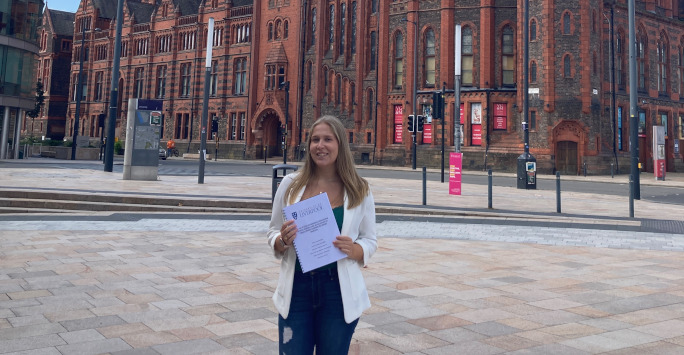Janie Bamforth
Year 5 student doctor Janie Bamforth intercalated in LLM Law, Medicine and Healthcare at University of Liverpool, School of Law and Social Justice.
I undertook an intercalated degree during my medical training to broaden my skills, develop new ways of learning and research topics of interest in further depth. The LLM in Law, Medicine and Healthcare offered me the chance to do all of these things. The modules I selected were Medicolegal Problems, Ethics in Healthcare Decision Making, International Human Rights Law, Children Medicine and the Law, Reproductive Justice and Global Health Law.
I found the course really enjoyable and all of the modules were fascinating. The Children Medicine and Law and Reproductive Justice modules were of particular interest to me.
I had developed an interest in both Women and Children’s Health during my placements at Alder Hey Children’s Hospital and Liverpool Women’s Hospital, so to further explore the legal context of these topics was fantastic.
When it came to choosing a topic for my dissertation, I knew I wanted to focus on paediatrics, as this is the field of medicine I hope to pursue. I was particularly interested in adolescence, where the lines between childhood and adulthood become blurred. A prominent case at the time centred around transgender adolescents, and their ability to consent to gender-affirming healthcare for themselves. I knew next to nothing about the topic, but saw this as a great opportunity to research a new field.

Whilst conducting my research, I had a number of opportunities to attend talks and debates on the topic. The first was a round-table discussion hosted by the Liverpool Student LGBT+ Society, in which both medical and legal perspectives on the case were discussed. From this, I was able to get in contact with a Law PhD student who had studied this topic in depth for both her Masters dissertation and PhD, and she was a great help in getting me started on understanding the case. For any student doctors interested in intercalating, I would definitely recommend reaching out to as many helpful contacts as you can! As they say, it’s not what you know, it’s who you know! I also attended debates and talks on the case given by academics at Liverpool and Bristol universities, which further helped with my research.
Once I’d completed my dissertation, I saw an advert from Great Ormond Street Hospital Postgraduate Medical Education Department, asking for abstract submissions from foundation doctors and medical students for a Virtual Law and Ethics Masterclass they were running. I submitted a summary of my dissertation findings and was lucky enough to be asked to give an oral presentation of my research. The judges and audience asked interesting questions after my presentation and awarded me joint 1st place!
I was really proud to gain a Distinction in both my dissertation and overall degree, and was also awarded the “Best Contribution to the Life of the Liverpool Law School” graduation prize, for getting involved with the extra talks and debates which helped with my dissertation.
I would 100% recommend intercalating to any student doctors who may be on the fence about it. When I started medical school, I thought 5 years sounded long enough and had no interest in intercalating at all, but the further through my studies I got, the more I started to consider it. I was really torn right up until accepting my offer for the Masters programme, but I am now so glad I said yes. The LLM programme has both developed the skills I’ve learnt whilst studying medicine, as well as teaching me brand new skills which will help me to become a better Doctor, and hopefully Paediatrician, than I otherwise would have been.